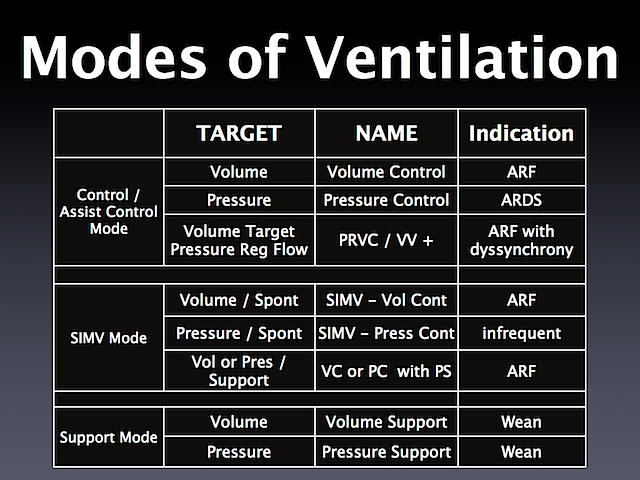Endocrine Disorder Cheat Sheet for Nursing. Cushing’s vs Addison’s vs Graves vs Hypothyroidism. Must need for your NCLEX exam.
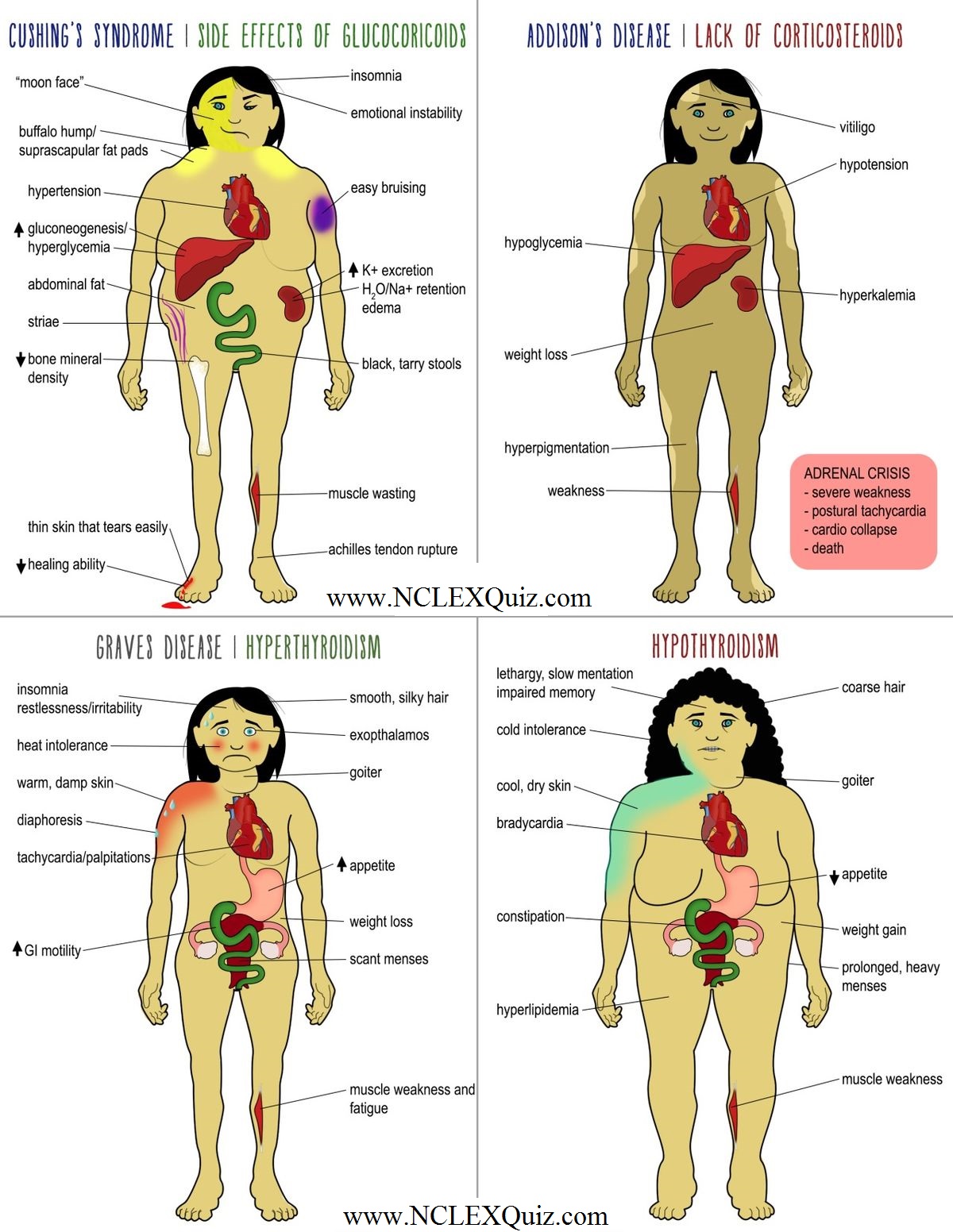
Help a Fellow Nurse!
Share This Cheatsheet with Someone Who Also Could Use Help
Endocrine Disorder Cheat Sheet for Nursing. Cushing’s vs Addison’s vs Graves vs Hypothyroidism. Must need for your NCLEX exam.

Help a Fellow Nurse!
Share This Cheatsheet with Someone Who Also Could Use Help
Endocrine Disorder Cheat Sheet for Nursing. Cushing’s vs Addison’s vs Graves vs Hypothyroidism. Must need for your NCLEX exam.

Help a Fellow Nurse!
Share This Cheatsheet with Someone Who Also Could Use Help
Philips Respironics has introduced the Wisp Pediatric Nasal Mask, which supports non-invasive ventilation (NIV) and is the most recent addition to the company’s Wisp family of masks.
Designed specifically for children, the mask features a child-friendly giraffe fabric pattern, a modified cushion curvature, along with support tools to help provide a positive experience for young patients and their families. With the introduction of the mask, the Wisp family now serves infant to adult patients for continuity and consistency in therapy.Noninvasive ventilation (NIV) therapy is used to treat breathing difficulties, often caused by obstructive sleep apnea (OSA), or neuromuscular disorders such as muscular dystrophy.
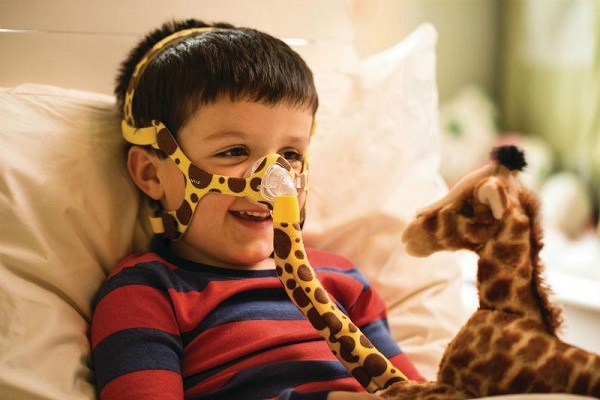
The Wisp Pediatric Nasal Mask will be available in the U.S. and Europe in the second half of 2016, with launches in additional markets expected to follow.
You can get a quick idea of how well the patient organizes his thoughts by asking the questions below. An incorrect answer to any question may indicate the need for a more thorough examination of mental status. Be sure you know the correct answers before asking the questions.
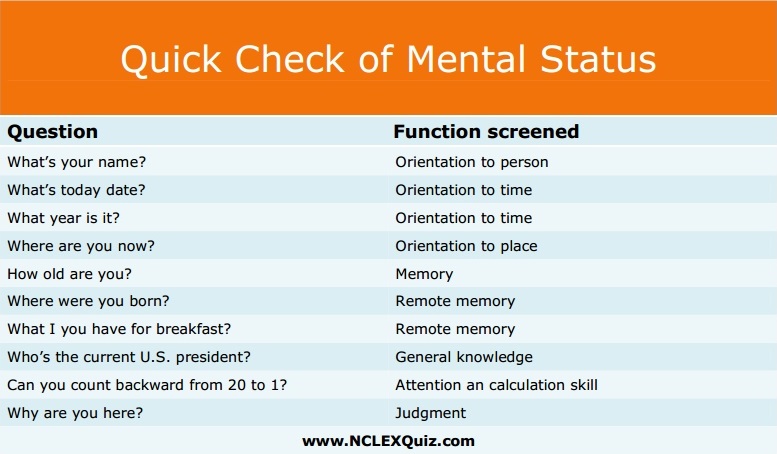
Today, we’re listing up 7 habits of highly INeffective CNA’s. If you recognize yourself, change your habits.
1) She calls out often; or is late; or leaves early. A CNA cannot be effective when they are not at work.
2) She is inflexible. She won’t alter her assignment to make things fair to all; she refuses to take on extra residents without a battle; she refuses to change her routine for the residents’ benefit.
3) Teamwork: She either belongs to a clique or is a loner. The clique is negative and spends much time backstabbing other aides. The loner never smiles or offers to assist others. She isn’t helpful with new aides.
4) She is on the phone. A lot. Either her own or the facility phone. She makes calls when the nurses are busy and away from the nurses station.
5) She spend a lot of “down” time behind the nurses station. Sitting. Doing her nails or braiding her hair. Not answering call bells; ignoring requests for help. Yet she has no problem gabbing with staff from other departments.
6) She’s a gossip queen and a rumor monger. She seeks out others to spread stories and tales true and untrue.
7) She never volunteers for anything. She avoids putting any extra effort or thought into situations that require it. Residents don’t dislike her, but they don’t favor her either. She doesn’t bring on smiles to those she encounters at work.
For years I have seen the books and articles titled, 7 Habits of Highly Effective People…so I thought I would come up with a list for CNA’s.
1) She is proactive. Proactive CNA’s use their resourcefulness and initiative to find solutions rather than just reporting problems and waiting for other people to solve them.
2) She has a personal mission statement. This is based upon personal morals and values- and it is almost always used as a stepping stone to make choices and decisions.
3) She knows how to balance her time between residents/patients. The CNA can set priorities based upon residents’ medical needs vs. non-medical wants. She recognizes when a needy resident truly requires some TLC and when something else is going on.
4) She isn’t interested in being in CONTROL. The CNA seeks a win/win relationship with her residents, but realizes this isn’t always possible. She will go out of her way to allow the resident to maintain control with as many choices as possible. The resident’s dignity and individuality is always respected.
5) She listens to her residents. And uses effective communication skills to make sure she understands what is being said. The CNA knows some times a resident doesn’t understand her, so she goes out of her way to make sure she is understood.
6) She works WITH the resident to overcome conflicts and misunderstandings. Instead of being defensive, the CNA will admit to her faults in the problem, and will seek to improve and correct these issues.
7) She knows when to step away. She knows she’s getting burnt out and is in need of a vacation, or a change in assignment.
An important part of pediatric nursing is understanding when immunizations need to be given. This cheatsheet will help you keep all of that straight.

We hope this is helpful to you in your studies.
Here is a fun list of my favorite nursing-related comments and the tongue-in-cheek comebacks I have managed to bite back in order to remain professional. Yes, some things are better left unsaid:
My top 10 responses to annoying patients
10. “Those scrubs make you look fat.”
Comeback: “You’re just jealous that I get to work in something akin to my pajamas!”
9. “All nurses are overpaid, fat and lazy.” (Yes, had a patient say this to me once. Then she gave me a “thank-you” gift.)
Comeback: “This fat, overpaid, lazy nurse just saved you and your baby’s life.”
8. “The floor is so quiet and peaceful!” (Especially irritating when yelled at 3AM by a newly admitted patient to a full floor.)
Comeback: “I have Micropore tape and I’m not afraid to use it!”
7. Patient states, “The nurses just hang out at the nurses station and play on their computers.”
Comeback: “If 14 hours of continuous charting, about you, on the computer amounts to play, I’d like to know what you think work is?”
6. “It must be so cool to work in an environment like _____.” (Insert TV shows like House, ER, Scrubs, etc.)
Comeback: “No, what would be really cool is if there was a TV show that showed the reality of nursing minus the soap opera–‘cuz it ain’t sexy.”
5. “The doctors are so cute! Is it true they only date nurses?”
Comeback: “The doctors don’t look so cute at 2AM when they are disheveled, covered in blood and screaming at the nurses. Just sayin’.”
4. After getting a patient something to drink or eat; “Wow, you are just like a waitress.” Or even better, “This place is just like a hotel!”
Comeback: “A waitress in a hotel wouldn’t put up with your crap. Literally.”
3. “It must be so nice only working three days a week.”
Comeback: “It must be so nice not to be burned out due to sleep deprivation and stress.”
2. “#$@% ^&^ %**&^!!!!!” (insert expletives, possibly in combination with rude hand gestures)
Comeback: “#$@% ^&^ %**&^!!!!!” (insert expletives, possibly in combination with rude hand gestures)
1. And lastly, the ultimate “compliment”:”You are so good, you should have become a doctor!”
Comeback: “Honey, you couldn’t pay me to become a doctor!”
Runner up: “We all ordered out but forgot to ask you because you looked so busy!”
This one never warrants a comeback–just payback for next time! 🙂
Your Handy Interpretation of Acid Base Disturbances
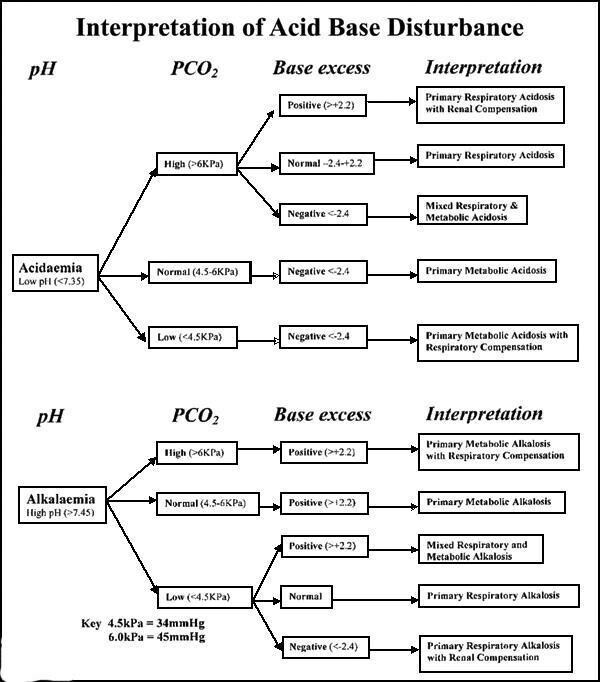
A Taxonomy for Mechanical Ventilation Cheat Sheet
